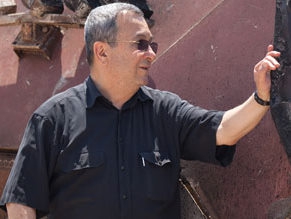|
World Jewish News

On a visit to the scene of Sunday's attack on the Sinai border, Israeli Defence Minister Ehud Barak said he hoped the incident would serve as a “a necessary wake-up call for the Egyptians to take matters in their hands in a more serious way”
|
Muslim Brotherhood claims Sinai attack on Egyptians ‘can be attributed to Mossad’
07.08.2012, Israel and the World Egypt’s Muslim Brotherhood party has issued a statement attributing blame for an attack on Egyptian policemen in Sinai Sunday to Israeli intelligence service Mossad.
According to a statement published on its website Monday, the launch on a police station in Kerem Shalom, which resulted in the deaths of 16 Egyptians as they broke their Ramadan fast, was an attempt to undermine the authority of the Islamist party’s newly-elected presidential candidate Mohammed Morsi.
Calling on Morsi to “review the clauses” of Egypt’s 1979 peace accord with Israel in response, the group accused Mossad of “seeking to abort the revolution since its inception”, referring to the popular uprisings which last year brought regime changes across much of the Arab world, and accused the organisation of employing as proxies “Zionist citizens in Sinai” to carry out the attacks.
According to Egyptian sources, the claims are widely subscribed to by Egyptians, as Israel is seen as the principle beneficiary of the attacks, having previously warned its citizens to avoid travelling to the Sinai region.
Egyptian newspaper Al-Ahram reported Tuesday that dozens of Egyptian protestors demonstrated outside the Israeli ambassador’s residence in Cairo overnight Monday in response to the allegations of Mossad involvement, calling on the government to break its peace agreement with Israel.
As it was claimed by the Israeli Defence Force (IDF) that Israel had shared information of a planned attack with Egyptian authorities as early as Friday, however, Israeli Foreign Ministry spokesman Yigal Palmor refuted Egyptian accusations of Israeli involvement, insisting: “Even the person who says this when he looks at himself in the mirror does not believe the nonsense he is uttering.”
Deputy Foreign Minister Danny Ayalon further asserted that Egypt has as much to gain as Israel from taking control of the region, stating in an interview with Army Radio on Tuesday: “I believe that Cairo will enlist to the cause and do all they can,” with the framework of the Israeli-Egyptian peace accord.
Insisting communication between the two administrations had already increased in the immediate aftermath of the attack, he added: “We can already see improvement on the ground. The incident shocked the senior echelons in Cairo. What remains to be seen is whether it will last”.
Morsi responded to what is undoubtedly the first real test of his newly-declared administration by employing Egyptian Air Force fighter jets along the Sinai Peninsula Monday, the first time such action has been called for since the 1979 treaty with Israel was signed.
According to Dr Jacques Neriah, an analyst at Jerusalem’s Centre for Public Affairs, however, Morsi’s hands will be tied with regards to taking decisive action in the early days of his fledging rule. “Morsi has reason to want to chop off a few heads, to show that order has been restored,” he said. “But he does not have enough oxygen in his lungs to launch a major operation”, as a military operation to regain control of the peninsula is likely to take months rather than weeks to achieve.
For Israel, however, the main priority for Egypt must be a cracking down on Islamist terror cells operating in central and northeastern Sinai. Initial IDF investigation into the attack revealed Monday that the responsible terrorist managed to drive about a mile inside Israel towards Kibbutz Kerem Shalom before the Israeli Air Force managed to blow up their armoured vehicle without causing further risk to surrounding traffic.
The IDF further reported that eight terrorists had been killed in the attack, six of whom were wearing explosive belts. It claimed the perpetrators were part of a global Islamist terror cell operating inside Sinai, primarily made up of local Bedouin.
The Israeli Shin Bet intelligence service reportedly warned Egyptian army officials of a generic planned attack at the Sinai border crossing on Friday, ahead of the terrorist attack. Israel’s Southern Command forces closed a guard tower close to the crossing ahead of the attack and ordered residents to stay inside their homes. Egyptian security chiefs allegedly dismissed Israel’s previous warnings of an imminent attack as an attempt to sabotage tourism in the region.
Speaking to the Knesset Foreign Affairs and Defence Committee Monday, Israeli Defence Minister Ehud Barak said he hoped the incident would provide “a necessary wake-up call for the Egyptians to take matters in their hands in a more serious way”. On a tour of the border, Foreign Minister Avigdor Lieberman meanwhile said he didn’t think “Egypt needs any advice from us, they alone understand the significance of these type of actions”.
“I only hope that they draw the conclusions and we see results as fast as possible for the good of the whole region,” he added.
An official statement by the Israeli Foreign Ministry meanwhile claimed the attack had been “aimed at shattering the peace agreement between Israel and Egypt”, adding that it was meant to cause the death of Israelis as well as Egyptians.
“Peace between the two countries has been, and still is, an interest common to both peoples; Israel will continue to act in a spirit of cooperation with Egypt in order to preserve this vital interest and ensure security and stability in the region,” it concluded.
by: Shari Ryness
EJP
|
|
